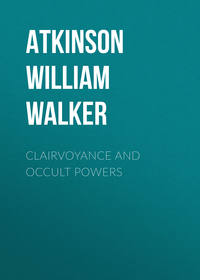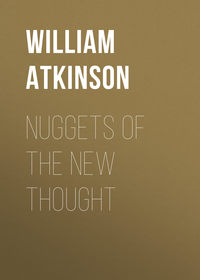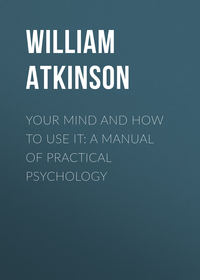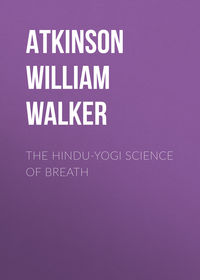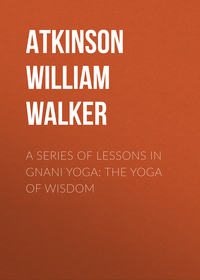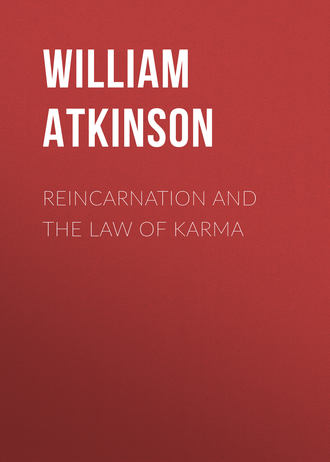 полная версия
полная версияReincarnation and the Law of Karma
Still another class of Reincarnationists in the Western World incline rather more toward the Grecian and Egyptian forms of the doctrine, than the Hindu – the ideas of the Neo-Platonists which had such a powerful effect upon the early Christian Church, or rather among the "elect few" among the early Fathers of the Church, seeming to have sprung into renewed activity among this class. These people, as we have said in the beginning of this chapter, are rather inclined to group themselves into small organizations or secret orders, rather than to form popular cults. They follow the examples of the ancients in this respect, preferring the "few elect" to the curious general public who merely wish to "taste or nibble" at the Truth. Many of these organizations are not known to the public, as they studiously avoid publicity or advertisement, and trust to the Law of Attraction to "bring their own to them – and them to their own." The teachings of this class vary in interpretation, and as many of them maintain secrecy by pledges or oaths, it is not possible to give their teachings in detail.
But, generally speaking, they base their doctrines on the general principle that Man's present condition is due to the "Descent of Spirit," in the nature of "The Fall of Man," occurring some time in the far distant past. They hold that Man was originally "Spirit Pure and Free," from which blissful state he was enticed by the glamour of Material Life, and he accordingly fell from his higher state, lower and lower until he was sunken deep into the mire of Matter. From this lowly state he then began to work up, or evolve, having in the dim recesses of his soul a glimmer of remembrance of his former state, which dim light is constantly urging him on and on, toward his former estate, in spite of his frequent stumbling into the mire in his attempts to rise above it. This teaching holds to a theory and doctrine very similar to that of the "Spiritists" just mentioned, except that while the latter, in common with the majority of Reincarnationists, hold that the evolution of the Soul is in the direction of advancement and greater expression, similar to the growth of a child, these "secret order" people hold forcibly and earnestly to the idea that the evolution is merely a "Returning of the Prodigal" to his "Father's Mansion" – the parable of the Prodigal Son, and that of the Expulsion from Eden, being held as veiled allegories of their teaching.
In the above view, the present state of existence – this Earthly Life – is one of a series of Hells, in the great Hell of Matter, from which Man is creeping up slowly but surely. According to this idea, the Earth is but midway in the scale, there being depths of Materiality almost impossible of belief, and on the other hand, heights of heavenly bliss equally incapable of understanding. This is about all that we can say regarding this form of the doctrine, without violating certain confidences that have been reposed in us. We fear that we have said too much as it is, but inasmuch as one would have to be able to "read between the lines" to understand fully, we trust that those who have favored us with these confidences will pardon us.
There is still another class of believers in Reincarnation, of which even the general public is not fully aware, for this class does not have much to say regarding its beliefs. I allude to those in the ranks of the orthodox Christian Church, who have outgrown the ordinary doctrines, and who, while adhering firmly to the fundamental Christian Doctrines, and while clinging closely to the Teachings of Jesus the Christ, still find in the idea of Rebirth a doctrine that appeals to their souls and minds as closer to their "highest conceptions of immortality" than the ordinary teachings of "the resurrection of the body," or the vague doctrines that are taking its place. These Christian Reincarnationists find nothing in the doctrine of Reincarnation antagonistic to their Faith, and nothing in their Faith antagonistic to the doctrine of Reincarnation. They do not use the term Reincarnation usually, but prefer the term "Rebirth" as more closely expressing their thought; besides which the former term has a suggestion of "pagan and heathen" origin which is distasteful to them. These people are inclined toward Rebirth for the reason that it "gives the soul Another Chance to Redeem Itself" – other chances to perfect itself to enter the Heavenly Realms. They do not hold to an idea of endless reincarnation, or even of continued earthly incarnation for all, their idea being that the soul that is prepared to enter heaven passes on there at once, having learned enough and earned enough merit in the few lives it has lived on earth – while the unprepared, undeveloped, and unfit, are bound to come back and back again until they have attained Perfection sufficient to enable them to advance to the Heaven World.
A large number of the Christian Reincarnationists, if I may call them by that name, hold that Heaven is a place or state of Eternal Progression, rather than a fixed state or place – that there is no standing still in Heaven or Earth – that "In my Father's House are Many Mansions." To the majority, this idea of Progression in the Higher Planes seems to be a natural accompaniment to the Spiritual Progression that leads to the Higher Planes, or Heaven. At any rate, the two ideas seem always to have run together in the human mind when the general subject has been under consideration, whether in past time or present; whether among Christians or "pagans and heathen." There seems to be an intuitive recognition of the connection of the two ideas. And on the other hand, there seems to be a close connection between the several views of "special creation" of the soul before both – the single earth-life – and the eternity of reward or punishment in a state or place lacking progression or change. Human thought on the subject seems to divide itself into two distinct and opposing groups.
There are quite a number of Christian preachers, and members of orthodox churches, who are taking an earnest interest in this doctrine of Rebirth, and Eternal Progression here and hereafter. It is being considered by many whose church associates do not suspect them of being other than strictly orthodox in their views. Some day there will be a "breaking out" of this idea in the churches, when the believers in the doctrine grow in numbers and influence. It will not surprise careful observers to see the Church once more accepting the doctrine of Rebirth and reinstating the doctrine of Pre-existence – returning to two of its original truths, long since discarded by order of the Councils. Prof. Bowen has said: "It seems to me that a firm and well-grounded faith in the doctrine of Christian Metempsychosis might help to regenerate the world. For it would be a faith not hedged round with many of the difficulties and objections which beset other forms of doctrine, and it offers distinct and pungent motives for trying to lead a more Christian life, and for loving and helping our brother-man." And as James Freeman Clarke has said: "It would be curious if we should find science and philosophy taking up again the old theory of metempsychosis, remodelling it to suit our present modes of religious and scientific thought, and launching it again on the wide ocean of human belief. But stranger things have happened in the history of human opinion."
So, as we have said, there is a great variety of shades of belief in the Western world regarding Reincarnation today, and the student will have no difficulty in finding just the shade of opinion best suited to his taste, temperament and training or experience. Vary as they do in detail, and theory, there is still the same fundamental and basic truth of the One Source – the One Life – and Reincarnation, reaching ever toward perfection and divinity. It seems impossible to disguise the doctrine so as to change its basic qualities – it will always show its original shape. And, so it is with the varying opinions of the Western thought regarding it – the various cults advocating some form of its doctrine – the original doctrine may be learned and understood in spite of the fanciful dressings bestowed upon it. "The Truth is One – Men call it by many names."
It may be of interest to Western readers to mention that some of the teachers of Occultism and Reincarnation hold that the present revival of interest on the subject in the Western world is due to the fact that in Europe and America, more particularly the latter, there is occurring a reincarnating of the souls of many persons who lived from fifteen hundred to two thousand years ago, and who were then believers in the doctrine. According to this view, those who are now attracted toward the Hindu forms of the doctrine formerly lived as natives of India; those who favor the Grecian idea, lived in Ancient Greece; others favor the Egyptian idea, from similar reasons; while the revival of Neo-Platonism, Gnosticism and general Mysticism, among the present-day Christians is accounted for by the fact that the early Christians are now reincarnating in the Western world, having been reborn as Christians according to the Law of Karmic Attraction. In this manner the advocates of the doctrine offer the present revival as another proof of their teachings.
CHAPTER VII
Between and Beyond Incarnations
One of the first questions usually asked by students of the subject of Reincarnation is: "Where does the soul dwell between incarnations; does it incarnate immediately after death; and what is its final abode or state?" This question, or questions, have been asked from the beginning, and probably will be asked so long as the human mind dwells upon the subject. And many are the answers that have been given to the questioners by the teachers and "authorities" upon the subject. Let us consider some of the leading and more "authoritative" answers.
In the first place, let us consider that phase of the question which asks: "Does the soul incarnate immediately after death?" Some of the earlier Reincarnationists believed and taught that the soul reincarnated shortly after death, the short period between incarnations being used by the soul in adjusting itself, striking a balance of character, and preparing for a new birth. Others held that there was a period of waiting and rest between incarnations, in which the soul 'mentally digested' the experiences of the last life just completed, and then considered and meditated over the mistakes it had made, and determined to rectify the mistakes in the next life – it being held that when the soul was relieved of the necessities of material existence, it could think more clearly of the moral nature of its acts, and would be able to realize the spiritual side of itself more distinctly, in addition to having the benefit of the spiritual perspective occasioned by its distance from the active scenes of life, and thus being able to better gauge the respective "worth-whileness" of the things of material life.
At the present time, the most advanced students of the subject hold that the average period of rest between incarnations is about fifteen hundred years, the less advanced souls hastening back to earth in a very short time, the more advanced preferring a long period of rest, meditation and preparation for a new life. It is held that the soul of a gross, material, animal-like person will incarnate very shortly after death, the period of rest and meditation being very short, for the reason that there is very little about which such a soul could meditate, as all of its attractions and desires are connected with material life. Many souls are so "earth-bound" that they rush back at once into material embodiment if the conditions for rebirth are favorable, and they are generally favorable for there seems to be always an abundant supply of new bodies suitable for such souls in the families of people of the same character and nature, which afford congenial opportunities for such a soul to reincarnate. Other souls which have progressed a little further along the path of attainment, have cultivated the higher part of themselves somewhat, and enjoy to a greater extent the period of meditation and spiritual life afforded them. And so, as the scale advances – as the attraction for material life grows less, the period of purely spiritual existence between incarnations grows longer, and it is said that the souls of persons who are highly developed spiritually sometimes dwell in the state of rest for ten thousand years or more, unless they voluntarily return sooner in order to take part in the work of uplifting the world. It must be remembered, in this connection, that the best teaching is to the effect that the advanced souls are rapidly unfolding into the state in which they are enabled to preserve consciousness in future births, instead of losing it as is the usual case, and thus they take a conscious part in the selection of the conditions for rebirth, which is wisely denied persons of a more material nature and less spiritual development.
The next phase of the question: "Where does the soul dwell between incarnations?" is one still more difficult of answer, owing to the various shades of opinion on the subject. Still there is a fundamental agreement between the different schools, and we shall try to give you the essence or cream of the thought on the subject. In the first place, all occultists set aside any idea of there being a "place" in which the souls dwell – the existence of "states" or "planes of existence" being deemed sufficient for the purpose. It is held that there are many planes of existence in any and every portion of space, which planes interpenetrate each other, so that entities dwelling on one plane usually are not conscious of the presence of those on another plane. Thus, an inhabitant of a high plane of being, in which the vibrations of substance are much higher than that which we occupy, would be able to pass through our material world without the slightest knowledge of its existence, just as the "X rays" pass through the most solid object, or as light passes through the air. It is held that there are many planes of existence much higher than the one we occupy, and upon which the disembodied souls dwell. There are many details regarding these planes, taught by the different schools of occultism, or spiritualism, but we have neither the time nor space to consider them at length, and must content ourselves with mentioning but a few leading or typical beliefs or teachings on the subject.
The Theosophists teach that just when the soul leaves the body, there occurs a process of psychic photography in which the past life, in all of its details, is indelibly imprinted on the inner substance of the soul, thus preserving a record independent of the brain, the latter being left behind in the physical body. Then the Astral Body, or Etheric Double, detaches itself from the body, from which the Vital Force, or Prana-Jiva also departs at the same time, the Astral Body enfolding also the four other principles, and together the Five Surviving Principles pass on to the plane of Kama Loka, or the Astral Plane of Desire. Kama Loka is that part of the Astral Plane nearest to the material plane, and is very closely connected with the latter. If the soul is filled with hot and earnest desire for earth life, it may proceed no further, but may hasten back to material embodiment, as we said a moment ago. But if the soul has higher aspirations, and has developed the higher part of itself, it presses on further, in which case the Astral Body, and the Animal Soul which is the seat of the passions and grosser desires, disintegrate, and thus release the Triad, or three-fold higher nature of the soul, namely the higher human soul, the spiritual soul, and the spirit – or as some term them, the intellect, the spiritual mind, and the spirit. The Triad then passes on to what is known as the plane of Devachan, where it rests divested of the lower parts of its nature, and in a state of bliss and in a condition in which it may make great progress by reason of meditation, reflection, etc. Kama Loka has been compared to the Purgatory of the Catholics, which it resembles in more ways than one, according to the Theosophists. Devachan is sometimes called the Heaven World by Theosophists, the word meaning "the state or plane of the gods."
Theosophy teaches that the Soul Triad dwells in Devachan "for a period proportionate to the merit of the being," and from whence in the proper time "the being is drawn down again to be reborn in the world of mortals." The Law of Karma which rules the earth-life of man, and which regulates the details of his rebirth, is said to operate on the Devachnic Plane as well, thus deciding the time of his abode on that plane, and the time when the soul shall proceed to rebirth. The state of existence in Devachan is described at length in the Theosophical writings, but is too complex for full consideration here. Briefly stated, it may be said that it is taught that the life on Devachan is in the nature of a Dream of the Best that is In Us – that is, a condition in which the highest that is in us is given a chance for expression and growth, and development. The state of the soul in Devachan is said to be one of Bliss, the degree depending upon the degree of spiritual development of the soul, as the Bliss is of an entirely spiritual nature. It may be compared to a state of people listening to some beautiful music – the greater the musical development of the person, the greater will be his degree of enjoyment. It is also taught that just as the soul leaves Devachan to be reincarnated, it is given a glimpse of its past lives, and its present character, that it may realize the Karmic relations between the cause and effect, to the end that its new life may be improved upon – then it sinks into a state of unconsciousness and passes on to rebirth.
The Western school of the Yogi Philosophy gives an idea of the state between incarnations, somewhat eclectic in its origin, agreeing with the Theosophical teaching in some respects, and differing from it in others. Let us take a hasty glance at it. In the first place it does not use the terms "Kama Loca" and "Devachan" respectively, but instead treats the whole series of planes as the great "Astral World" containing many planes, divisions, and subdivisions – many sub-planes, and divisions of the same. The teaching is that the soul passes out of the body, leaving behind its physical form, together with its Prana or Vital Energy, and taking with it the Astral Body, the Instructive Mind, and the higher principles. The "last vision" of the past life, in which the events of that life are impressed upon the soul just as it leaves the body, is held to be a fact – the soul sees the past life as a whole, and in all of its minutest details at the moment of death, and it is urged that the dying person should be left undisturbed in his last moments for this reason, and that the soul may become calm and peaceful when starting on its journey. On one of the Astral Planes the soul gradually discards its Astral Body and its Instinctive Mind, but retains its higher vehicles or sheaths. But it is taught that this discarding of the lower sheaths occurs after the soul has passed into a "soul-slumber" on a sub-plane of the Astral World, from which it awakens to find itself clothed only in its higher mental and spiritual garments of being, and free from the grosser coverings and burdens. The teachings say: "When the soul has cast off the confining sheaths, and has reached the state for which it is prepared, it passes to the plane in the Astral World for which it is fitted, and to which it is drawn by the Law of Attraction. The planes of the Astral World interpenetrate, and souls dwelling on one plane are not conscious of those dwelling on another, nor can they pass from one plane to another, with this exception – that those dwelling on a higher plane are able to see (if they so desire) the planes below them in the order of development, and are also able to visit these lower planes if they so desire. But those on the lower planes are not able to either see or visit the planes above them – not that there is a 'watchman at the gate' to prevent them, but for the same reason that a fish is not able to pass from the water to the plane of air above that water." The same teachings tell us that the souls on the higher planes often visit friends and relatives on the lower, so that there is always the opportunity for loved ones, relatives and friends meeting in this way; and also many souls on the higher planes pass to the lower planes in order to instruct and advise those dwelling on the latter, the result that in some cases there may be a progression from a lower to a higher plane of the Astral World by promotion earned by this instruction. Regarding Rebirth, from the Astral World, the teachings say:
"But sooner or later, the souls feel a desire to gain new experiences, and to manifest in earth-life some of the advancement which has come to them since 'death,' and for these reasons, and from the attraction of desires which have been smoldering there, not lived out or cast off, or, possibly influenced by the fact that some loved soul, on a lower plane, is ready to incarnate and wishing to be incarnated at the same time in order to be with it (which is also a desire) the souls fall into the current sweeping toward rebirth, and the selection of proper parents and advantageous circumstances and surrounding, and in consequence again fall into a soul-slumber, gradually, and so when their time comes they 'die' to the plane upon which they have been existing and are 'born' into a new physical life and body. A soul does not fully awaken from its sleep immediately at birth, but exists in a dream-like state during the days of infancy, its gradual awakening being evidenced by the growing intelligence of the babe, the brain of the child keeping pace with the demands made upon it. In some cases the awakening is premature, and we see cases of prodigies, child-genius, etc., but such cases are more or less abnormal, and unhealthy. Occasionally the dreaming soul in the child half-wakes, and startles us by some profound observation, or mature remark or conduct."
The third phase of the question: "What is the final state or abode of the soul?" is one that reaches to the very center or heart of philosophical and religious thought and teaching. Each philosophy and religion has its own explanation, or interpretation of the Truth, and it is not for us to attempt to select one teaching from the many in this work. The reader will find many references to these various explanations and teachings as he reads the several chapters of this book, and he may use his own discrimination and judgment in selecting that which appeals to him the most strongly. But he will notice that there is a fundamental agreement between all of the teachings and beliefs – the principle that the movement of the soul is ever upward and onward, and that there is no standing still in spiritual development and unfoldment. Whether the end – if end there be – is the reaching of a state of Bliss in the presence of the Divine One – or whether the weary soul finds rest "in the Bosom of the Father," by what has been called "Union with God" – the vital point for the evolving soul is that there is "a better day coming" – a haven of rest around the turn of the road. And whatever may be the details of the Truth, the fact remains that whatever state awaits the soul finally, it must be Good, and in accordance with Divine Wisdom and Ultimate Justice and Universal Love.
The majority of occultists look forward to an end in the sense of being absorbed in the Divine Being, not in the sense of annihilation, but in the sense of reaching a consciousness "of the Whole in the Whole" – this is the true meaning of "Nirvana." But whether this be true, or whether there is a place of final rest in the highest spiritual realms other than in the sense of absorption in the Divine, or whether there is a state of Eternal Progression from plane to plane, from realm to realm, on and on forever Godward, and more and more God-like – the End must be Good, and there is nothing to Fear, for "the Power that rules Here, rules There, and Everywhere. And remember this, ye seekers after ultimate truths – the highest authorities inform us that even the few stages or planes just ahead of us in the journey are so far beyond our present powers of conception, that they are practically unknowable to us – this being so, it will be seen that states very much nearer to us than the End must be utterly beyond the powers not only of our understanding but also of our imagination, even when strained to its utmost. This being so, why should we attempt to speculate about The End? Instead, why not say with Newman:



